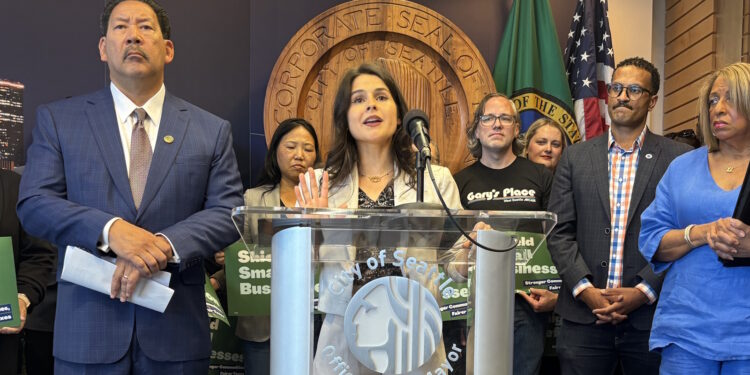In a unanimous decision on August 4, the Seattle City Council approved a sweeping business tax restructuring aimed at easing the burden on small businesses while increasing tax obligations for large corporations. The overhaul, known as the Seattle Shield Initiative, now awaits a public vote to determine its implementation.
The new plan proposes to eliminate the business and occupation (B&O) tax for companies earning up to $2 million annually. For larger companies surpassing that threshold, including giants like Amazon, the city plans to raise tax rates significantly. City analysts anticipate that the policy could generate an additional $80 million each year, with the funds allocated to programs addressing food insecurity, addiction treatment, immigrant support services, and other community initiatives.
Originally introduced on June 25 by Mayor Bruce Harrell and Councilmember Alexis Mercedes Rinck, the measure was fast-tracked for approval to meet the deadline for inclusion on the November 4 ballot. While the proposal initially aimed to address a projected $250 million shortfall in the city’s budget, compounded by a loss of federal aid, recent forecasts revised that deficit down to $150 million.
The city has long struggled to identify consistent and politically feasible revenue sources to support affordable housing, essential city services, and post-pandemic recovery, particularly in the downtown core. Last year, a proposal for a 2% capital gains tax targeting stock and bond profits exceeding $262,000 narrowly failed to pass the council.
Criticism of the current tax overhaul has been sharp, particularly from business advocacy groups. Jon Scholes, president and CEO of the Downtown Seattle Association, characterized the plan as a deeply flawed move, saying it poses “big risks to the fragile commercial tax base.” While Amazon has yet to comment publicly, other businesses have expressed concern over how the new tax structure could affect job creation and entrepreneurship.
Under the new policy, a service-based business generating $20 million in annual revenue would see its tax obligation rise from $85,400 to $117,720. A larger firm pulling in $100 million would see its tax jump from $427,000 to $640,920. However, companies in retail, wholesale, and manufacturing would face a smaller rate increase than those in the service sector.
City officials acknowledged the potential for less stable revenue under the plan, noting that the number of businesses paying the B&O tax would shrink from 21,000 to just 5,000. This concentration could make future collections more volatile.
Despite supporting the initiative, City Council President Sara Nelson flagged concerns about the speed of the process. She highlighted the scope of the change, pointing out that the B&O tax accounts for roughly a third of the city’s general fund, and noted that the potential economic and employment impacts warrant further scrutiny.
The Council did make targeted adjustments to the plan, rejecting calls to exempt the maritime sector while approving tax breaks for Seattle Children’s and Fred Hutchinson Cancer Center.
Rinck, who co-sponsored the legislation, characterized it as a smart and forward-thinking response to current financial challenges. She expressed hope that voters would support a measure designed to preserve essential services and shield neighborhood businesses, which she described as the “heartbeat” of Seattle’s local economy.
If approved by voters, the Seattle Shield Initiative would enact the following changes:
- The exemption threshold for the B&O tax would rise from $100,000 to $2 million in gross annual revenue.
- Companies exceeding that limit would still be exempt on their first $2 million.
- An estimated 76% of small and mid-sized businesses would no longer pay any B&O tax.
- Around 90% of all businesses would either see a tax cut or maintain their current tax burden.
- For businesses over the threshold, service companies would pay 65 cents per $100 earned (up from 43 cents), while retail, wholesale, and manufacturing firms would pay 34 cents per $100 (up from 22 cents).
The final decision now rests with Seattle voters, who will weigh in on the measure this November.







